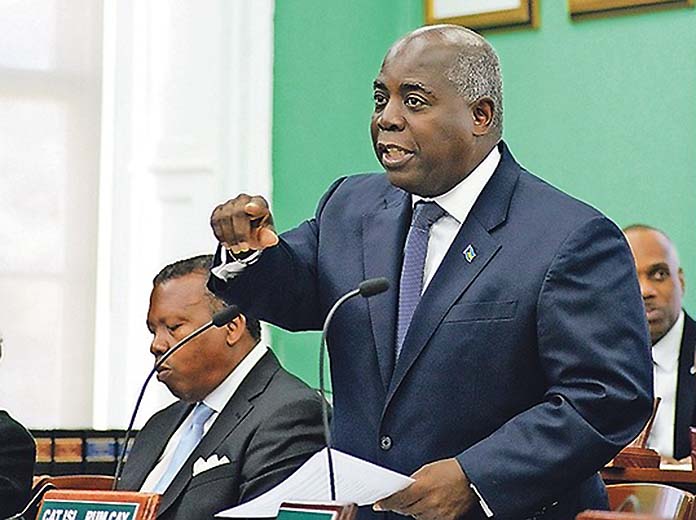
REMARKS
THE HON. PHILIP BRAVE DAVIS QC, MP
LEADER OF THE OPPOSITION
DEBATE ON THE EXTENSION OF EMERGENCY POWERS ORDERS
27TH APRIL 2020
Mr. Speaker,
As the nation heads into its sixth week of curfews and lockdowns due to COVID-19, I, like many Bahamians, have been looking for signs that we are making positive progress in the fight against this viral threat.
ARE WE WINNING OR LOSING THIS BATTLE?!
We are continuing to see an increase in both cases and deaths, despite the drastic measures we have asked our people to take.
So as we consider this extension to the emergency orders, the government has no higher obligation than to level with us about how things stand today, how they expect the next weeks and months to unfold, and when people can expect some light at the end of this tunnel.
I want to be very clear: we want this government to manage this crisis effectively and for our country to succeed in this war against this invisible enemy COVID-19.
My colleagues join me in this.
We are one nation.
All of our families and friends and communities are under threat. I have mourned friends together with many of my colleagues in the FNM; our grief is something we share. My cousin was a victim.
It is because I care so deeply that I offer today’s thoughts and concerns.
Mr. Speaker, lives are on hold. People’s ability to earn a living is on hold. Things are falling apart for a great many people.
No one should pretend that another week of lockdowns would somehow rid us of this virus, nor should the public, nearly all of whom are complying with new restrictions, be chastised and blamed for the continued spread.
The truth that is owed to our people is that our country still lacks a coherent strategy for mass testing – a crucial component for combating the spread of the virus.
Since we know that the virus can be spread even by people who have no symptoms, we need testing to include them in order to stop the virus in its tracks.
We need to constantly re-evaluate protocols for who gets tested, and how often. What percentage of the population does the government plan to test, and when will that capacity be in place? We need new resources and venues for isolating positive cases, we need additional personnel for contact tracing, and we need to be sure that our clinics and hospitals are ready for any surge in cases.
Bahamians have the right to ask their government to plan for more than a week or two at a time.
No one is asking for perfection.
No one is asking for the government to predict a far-off future. But people have a right to expect transparency and intelligent planning. That is especially the case when it comes to a plan to reopen our economy and help people and businesses begin to recover.
Six weeks in, the government’s response continues to be characterized by short-term thinking, reactive measures, and a lack of careful planning.
Look no further than the pandemonium unleashed at local grocery stores when the government announced the alphabetical list for shopping or the gridlock on the streets when our people were required to produce government issued identifications.
Or the questionable methodology used to determine which businesses are deemed essential and which aren’t — prompting many to question whether we are allowing special interests to influence key decision-makers in the middle of a global crisis.
I would like to remind the government that all businesses are essential to the workers who rely on these jobs to feed their families.
The very least people can expect is to have confidence that these decisions are made carefully, without special favour, and with a full understanding of the consequences.
As we move forward, it is important to note that the same social distancing policies that businesses such as Kelly’s or Quality Home Center are using to safely operate during this pandemic can also be used by other businesses. The process of allowing businesses to open their doors must be rolled out in a practical and fair manner.
We are seeing the uneven results of reactive, piecemeal policymaking in the overly Nassau-centric approach to fighting the virus while Bimini and Grand Bahama have been relatively neglected despite having confirmed cases and deaths.
I warned the government throughout the months of March and April that many of the initially announced measures were hastily implemented and did not adequately take into account the multi-faceted issues that are arising due to both the virus and the economic fallout.
Now, as the government seems to be relaxing some of its measures because of these same practical issues, a comprehensive plan is needed to keep our people safe. And these measures must be implemented very soon.
The government must work to cut through red tape and bureaucracy to produce faster results during this crucial time.
We talk about leveraging technology to facilitate more effective government processes and yet there are still widespread complaints about long delays and people being given the usual run-around when dealing with government services.
Delays during times like these can be devastating to people who are struggling to stay afloat.
Mr. Speaker,
These curfews and lockdowns are not being experienced in the same way by everyone. For many, the lockdowns themselves represent yet another threat to their health and security.
Recent reports by the Crisis Center have noted an uptick in domestic abuse cases. Other media reports have mentioned robbery sprees taking place in some communities in New Providence.
As economic and social pressure continue to increase, conditions will not get better on these fronts.
Men and women who live “over the hill” have complained about being harassed and even detained despite having legitimate reasons to be on the road.
Such incidents may be a consequence of the harmful effects of the curfew and lockdowns on persons working longer hours and undertaking tasks for which they are not adequately trained.
It is time for the government to explore and address the negative emotional impact these measures are having on our people including the police, the defense force and our first responders so that we may avoid any further build up of tensions and potential fallouts in the form of domestic abuses.
In other instances Mr. Speaker, the homeless and mentally ill are dragged before the courts in handcuffs and severely penalized. Others have been targeted with fines that seem grossly disproportionate to the offenses they are charged with.
We do not agree with the harshness of treatment.
I call on the government to renew its focus on addressing the social and economic forces that are impacting everyday men and women whose personal budgets have been stretched paper-thin.
This requires strengthening the social safety net, revisiting policing strategies, following through on plans for food banks and feeding networks, and doing all we can as a country to protect our at-risk populations.
The government must show that it will address any inequities and injustices quickly.
Mr. Speaker,
Given that civil liberties have been suspended, Parliament must be convened on a weekly basis (or at the very least, every ten days) to provide checks and balances on proposed policies. It is through this scrutiny that we will to give voice to the challenges faced by our people and help to ease their pain.
The Bahamian people are hurting Mr. Speaker.
They are worried that temporary layoffs will become permanent. They are afraid that the same government that has asked business owners to have a heart may not have a heart of its own.
They want some reassurance that the government has their back.
The country is bracing for severe economic decline.
The Bahamian people need more than strict lockdowns and stern press conferences to survive.
Our people want to see a plan for widespread testing. They want to see new protections for healthcare workers. They want to see a comprehensive recovery and reopening strategy.
Our people also want to know how the government will protect the public even as the economy reopens, especially those at highest-risk, like the elderly, people with high blood pressure and diabetics.
Where is the plan for our people?
Essential workers are on the frontlines risking their lives to ensure that our country continues to function throughout this period.
While it is important to honour and applaud them for their work, it is even more important to protect them. Too many of our medical personnel are falling ill. We must pull out all the stops to immediately prioritize their safety – there should be no expense spared to ensure that our frontline fighters are safe in this battle.
There are our citizens including students who are stuck in foreign countries, and our government has slammed the door in their faces. Many of them are alone and running out of money, and we are leaving it up to foreign entities to take care of them. It is time to let our people come home.
I’d like to remind the government that the opposition remains ready to help. As a party, the PLP has already launched an initiative to provide food care packages in communities throughout the country, and we are prepared and planning to do more.
We are all in this crisis together, and the opposition is prepared to provide assistance and expertise to the government in whatever way we can.
This is a time for collaboration. The more heads we put together, the more viable solutions we will develop.
We must recognize that our true strength emerges when we are working together towards a common goal.
We are still at the beginning of what is sure to be a very challenging time. I am so proud of how Bahamians are digging deep and pushing forward. I know that we will not only beat this situation, but we will work together to rise to new heights.
Thank you







